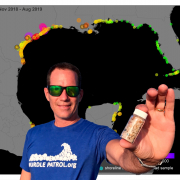
The Mission-Aransas National Estuarine Research Reserve at the University of Texas Marine Science Institute just launched a new interactive mapping website that allows citizen scientists to add plastic pellet (nurdles) data into a mapping system to show where the highest concentrations of nurdles are being found across the U.S. and Mexico. www.NurdlePatrol.org, Nurdles are small plastic pellets that are the raw material to almost everything made of plastic, and they are getting out into the environment before they are ever made into a plastic product. They can look like food to animals, and if they eat enough of these pellets, they can clog the digestive tract of the animal and it can starve. These pellets also are known to absorb chemical compounds such as PCBs, PAHs, and DDTs, which can be harmful to the animal. Data collected through Nurdle Patrol is used to inform regulatory agencies where further investigation could be done, creates awareness of the nurdle problem, and removes the plastic pellets from the shoreline where they can be eaten by wildlife. As of October 2, 2019, over 1,000 volunteers have collected over 2,600 surveys at over 1,200 sites across the United States and Mexico. Surveys consist of looking for nurdles for 10 minutes, then adding a location and number found into the NurdlePatrol.org reporting database. It's easy, it's fun, and it is making a difference! Join the movement!
In addition, volunteers can use the interactive maps to zoom in to their local area anywhere in the world, and with a click of the button, print their own map to show others and spread the word about the nurdle problem. News stories will begin to be added to the site so that volunteers and the public can be kept up to date on the latest details about nurdles, and efforts to reduce plastic pellets entering the environment. The solutions page offers information about a program called Operation Clean Sweep that includes best management practices that industry can follow and that governments can enforce to help prevent pellets from getting into our waterways.
Thanks to 11th Hour Racing for funding the website, the Conrad Blucher Institute at Texas A&M University-Corpus Christi for building the site, and to all the partners and volunteers that organize and collect the data. Have questions about how to conduct a survey? Watch this 5 minute video. Want to get involved as a partner, please contact jace@utexas.edu.

